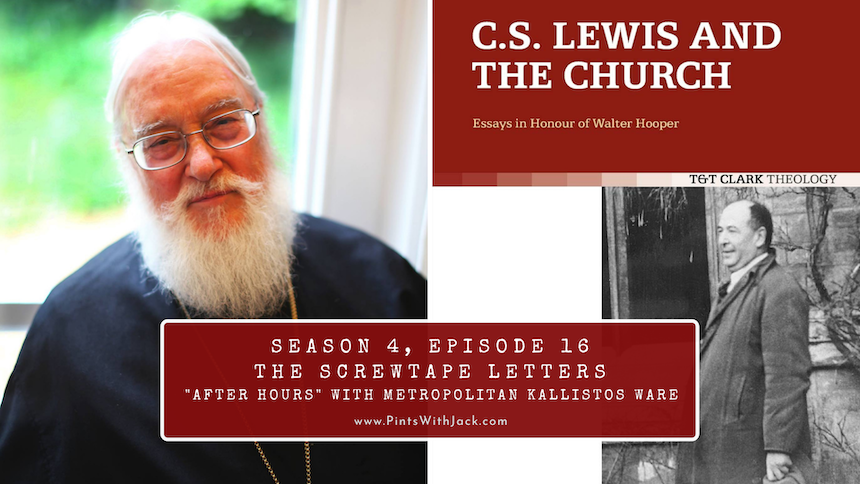PWJ: S4E16 – AH – “After Hours” with Metropolitan Kallistos Ware


Last Christmas I gifted myself a copy of “C.S. Lewis and The Church”, which was a collection of essays in honour of Walter Hooper. Among this collection was an essay by well-known Eastern Orthodox writer, Metropolitan Kallistos Ware. In his essay he spoke about aspects of Lewis’ theology which appeal to Eastern Orthodox readers. I loved the essay so I invited him onto the show to talk about it.
S4E16: “After Hours” with Metropolitan Kallistos Ware (Download)
If you enjoy this episode, you can subscribe manually, or any place where good podcasts can be found (iTunes, Google Play, Amazon, Podbean, Stitcher, TuneIn and Overcast), as well as on YouTube. The roadmap for Season 4 is available here.
More information about us can be found on our website, PintsWithJack.com. If you’d like to support us and get fantastic gifts, please join us on Patreon.
Timestamps
00:00 – Entering “The Eagle & Child”…
00:13 – Welcome
01:02 – Metropolitan Kallistos Ware
03:11 – Quote-of-the-week
04:07 – Drink-of-the-week
04:19 – Patreon Toast
04:37 – What is a Metropolitan?
06:11 – Encountering Lewis
12:18 – C.S. Lewis, an ‘anonymous Orthodox’?
13:57 – Confirmed contact with Orthodoxy
17:59 – Lewis and the Fathers
22:04 – Apophatic Theology
25:48 – Incarnation and Trinity
32:28 – Theosis
37:37 – Till We Have Faces
39:38 – More Information
42:29 – “Last Call” Bell and Closing Remarks
YouTube Version
After Show Skype Session
No Skype Session today!
Show Notes
Opening Chit-Chat
Biographical Information
- I shared some biographical information about my guest:
Timothy Ware was born in Bath, England. He was educated at Westminster School (to which he had won a scholarship) and Magdalen College, Oxford, where he took a Double First in Classics as well as reading Theology.
Bio for Metropolitan Kallistos Ware
Having been raised Anglican, at the age of 24, he embraced the Orthodox Christian faith, traveling subsequently throughout Greece, spending a great deal of time at the Monastery of St. John the Theologian in Patmos. He also frequented other major centers of Orthodoxy such as Jerusalem and Mount Athos. In 1966, he was ordained to the priesthood and was tonsured as a monk, receiving the name Kallistos. In the same year, he became a lecturer at Oxford, teaching Eastern Orthodox Studies, a position which he held for 35 years until his retirement.
In 1982, he was consecrated to the episcopacy as a titular bishop with the title Bishop of Diokleia. Despite his elevation, Kallistos remained in Oxford and carried on his duties both as the parish priest of the Oxford Greek Orthodox community and as a lecturer at the University. On March 30, 2007, the Holy Synod of the Ecumenical Patriarchate elevated the Diocese of Diokleia to Metropolis and Bishop Kallistos to Titular Metropolitan of Diokleia.
- I explained how I first came across Metropolitan Ware through his book, The Orthodox Church. However, it was after reading C.S. Lewis and the Church that I discovered he was an admirer of C.S. Lewis.
Quote-of-the-week
- The quote-of-the-week came from this letter:
The command “Be ye perfect” is not idealistic gas. Nor is it a command to do the impossible. He is going to make us into creatures that can obey that command…If we let Him—for we can prevent Him, if we choose—He will make the feeblest and filthiest of us into a god or goddess, a dazzling, radiant, immortal creature, pulsating all through with such energy and joy and wisdom and love as we cannot now imagine, a bright stainless mirror which reflects back to God perfectly (though, of course, on a smaller scale) His own boundless power and delight and goodness.
C.S. Lewis, Mere Christianity (Book IV, Chapter 9)
Drink-of-the-week
- Drink-of-the-week was a cup of Bird Rock coffee as I got up early to interview the Metropolitan who lives in England.
Patreon Toast
- I toasted Patreon supporter, Jeff Booth:
Jeff, thank you for your generous spirit. May you be blessed in return and always filled with the Divine Life.
Patreon Toast
Discussion
- Since we have listeners from a wide variety of Christian denominations, I began by asking what it actually means to be a Metropolitan.
- I asked Metropolitan Ware about his encounter with Lewis’ writings (and ultimately the man himself).
- Next, I asked about how he came to write his essay “C.S. Lewis, an ‘Anonymous Orthodox”.
- We next discussed how much contact Lewis had with the Orthodox Church.
- I next asked the Metropolitan about Lewis’ contact with the Early Church Fathers.
- In his essay, Metropolitan Ware highlighted different aspects of Lewis’ writings which appeal to Orthodox readers.
- We began by speaking about apophatic theology.
- We then discussed the Incarnation and the Trinity.
- We then spoke about theosis.
- We wrapped up by talking about Till We Have Faces and The Great Divorce.
- Metropolitan Ware recommended two of his books: The Orthodox Church and The Orthodox Way.